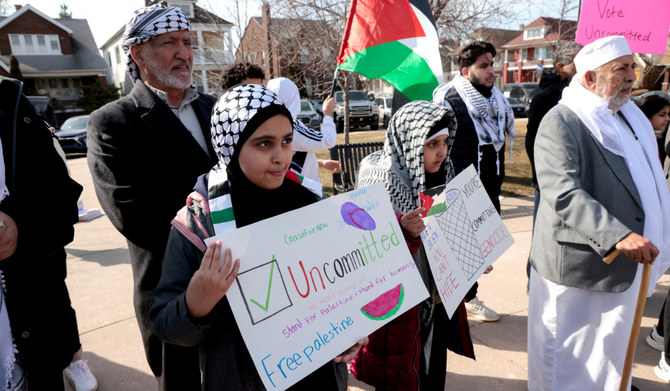DEARBORN, Michigan: President Joe Biden and former President Donald Trump won the Michigan primaries on Tuesday, further solidifying the all-but-certain rematch between the two men.
Biden defeated Minnesota Rep. Dean Phillips, his one significant opponent left in the Democratic primary. But Democrats were also closely watching the results of the “uncommitted” vote, as Michigan has become the epicenter for dissatisfied members of Biden’s coalition that propelled him to victory in the state — and nationally — in 2020. The number of “uncommitted” votes has already surpassed the 10,000-vote margin by which Trump won Michigan in 2016, surpassing a goal set by organizers of this year’s protest effort.
As for Trump, he has now swept the first five states on the Republican primary calendar. His victory in Michigan over his last major primary challenger, former UN Ambassador Nikki Haley, comes after the former president defeated her by 20 percentage points in her home state of South Carolina on Saturday. The Trump campaign is looking to lock up the 1,215 delegates needed to secure the Republican nomination sometime in mid-March.
Both campaigns are watching Tuesday’s results for more than just whether they won as expected. For Biden, a large number of voters choosing “uncommitted” could mean he’s in significant trouble with parts of the Democratic base in a state he can hardly afford to lose in November. Trump, meanwhile, has underperformed with suburban voters and people with a college degree, and faces a faction within his own party that believes he broke the law in one or more of the criminal cases against him.
Biden has already sailed to wins in South Carolina, Nevada and New Hampshire. The New Hampshire victory came via a write-in campaign as Biden did not formally appear on the ballot after the state broke the national party rules by going ahead of South Carolina, which had been designated to go first among the Democratic nominating contests.
Both the White House and Biden campaign officials have made trips to Michigan in recent weeks to talk with community leaders about the Israel-Hamas war and how Biden has approached the conflict, but those leaders, along with organizers of the “uncommitted” effort, have been undeterred.
The robust grassroots effort, which has been encouraging voters to select “uncommitted” as a way to register objections to his handling of Israel’s ongoing war in Gaza, has been Biden’s most significant political challenge in the early contests. That push, which began in earnest just a few weeks ago, has been backed by officials such as Democratic Rep. Rashida Tlaib, the first Palestinian American woman in Congress, and former Rep. Andy Levin.
Our Revolution, the organizing group once tied to Sen. Bernie Sanders, I-Vermont, had also urged progressive voters to choose “uncommitted” Tuesday, saying it would send a message to Biden to “change course NOW on Gaza or else risk losing Michigan to Trump in November.”
Trump won the state by just 11,000 votes in 2016 over Democratic candidate Hillary Clinton, and then lost the state four years later by nearly 154,000 votes to Biden. Organizers of the “uncommitted” effort wanted to show that they have at least the number of votes that were Trump’s margin of victory in 2016, to demonstrate how influential the bloc can be, and they reached that figure not long after the first round of polls in Michigan closed at 8 p.m.
Mariam Mohsen, a 35-year-old teacher from Dearborn, Michigan, said she had planned to vote “uncommitted” on Tuesday in order to send a message alongside other voters that “no candidate will receive our votes if they continue to support genocide in Gaza.”
“Four years ago I voted for Joe Biden. It was important that we vote to get Trump out of office,” Mohsen continued. “Today, I feel very disappointed in Joe Biden and I don’t feel like I did the right thing last election. If Trump is the nominee in November I would not vote for Trump. I would not vote for Trump or Biden. I don’t think, in terms of foreign policy, there will be any difference.”
Trump’s dominance of the early states is unparalleled since 1976, when Iowa and New Hampshire began their tradition of holding the first nominating contests. He has won resounding support from most pockets of the Republican voting base, including evangelical voters, conservatives and those who live in rural areas. But Trump has struggled with college-educated voters, losing that bloc in South Carolina to Haley on Saturday night.
Even senior figures in the Republican Party who have been skeptical of Trump are increasingly falling in line. South Dakota Sen. John Thune, the No. 2 Senate Republican who has been critical of the party’s standard-bearer, endorsed Trump for president on Sunday.
Shaher Abdulrab, 35, an engineer from Dearborn, said Tuesday morning that he voted for Trump. Abdulrab said he believes Arab Americans have a lot more in common with Republicans than Democrats.
Abdulrab said he voted four years ago for Biden but believes Trump will win the general election in November partly because of the backing he would get from Arab Americans.
“I’m not voting for Trump because I want Trump. I just don’t want Biden,” Abdulrab said. “He (Biden) didn’t call to stop the war in Gaza.”
Still, Haley has vowed to continue her campaign through at least Super Tuesday on March 5, pointing to a not-insignificant swath of Republican primary voters who have continued to support her despite Trump’s tightening grip on the GOP.
She also outraised Trump’s primary campaign committee by almost $3 million in January. That indicates that some donors continue to look at Haley, despite her longshot prospects, as an alternative to Trump should his legal problems imperil his chances of becoming the nominee.
Two of Trump’s political committees raised just $13.8 million in January, according to campaign finance reports released last week, while collectively spending more than they took in. Much of the money spent from Trump’s political committees is the millions of dollars in legal fees to cover his court cases.
With nominal intraparty challengers, Biden has been able to focus on beefing up his cash reserves. The Biden campaign and the Democratic National Committee announced last week that it had raised $42 million in contributions during January from 422,000 donors.
The president ended the month with $130 million in cash on hand, which campaign officials said is the highest total ever raised by any Democratic candidate at this point in the presidential cycle.
The Republican Party is also aligning behind Trump as he continued to be besieged with legal problems that will pull him from the campaign trail as the November election nears. He is facing 91 criminal changes across four separate cases, ranging from his efforts to overturn the results of the 2020 presidential election, which he lost, to retaining classified documents after his presidency to allegedly arranging secret payoffs to an adult film actor.
His first criminal trial, in the case involving hush money payments to porn actor Stormy Daniels, is scheduled to begin on March 25 in New York.


















